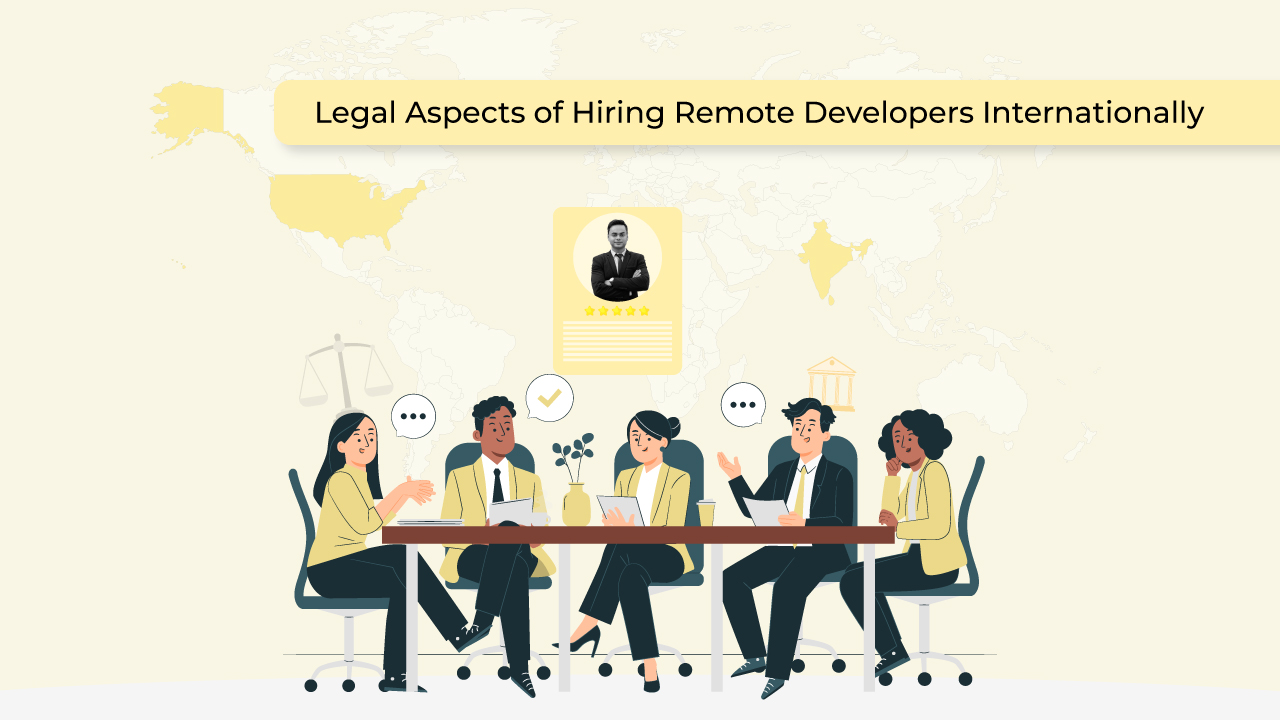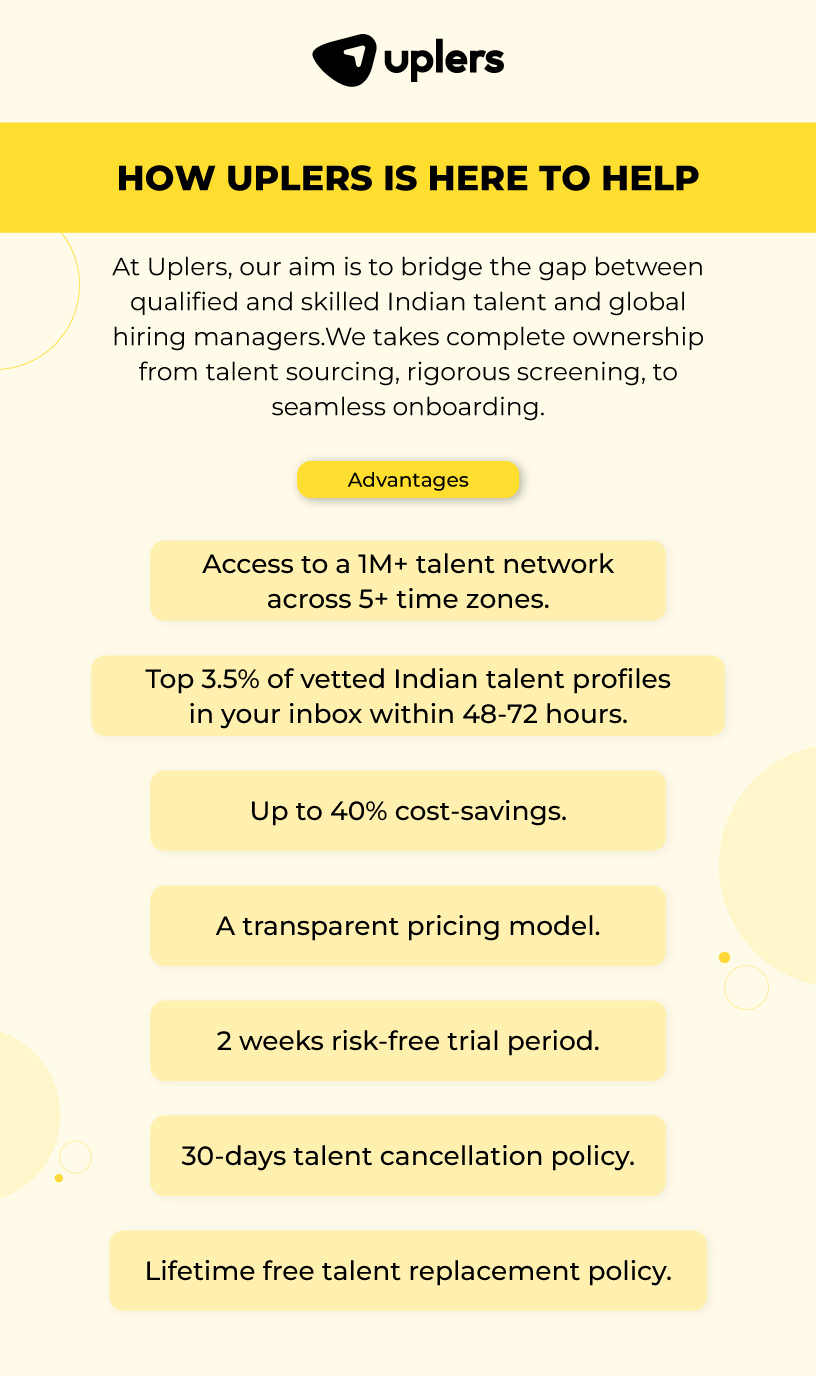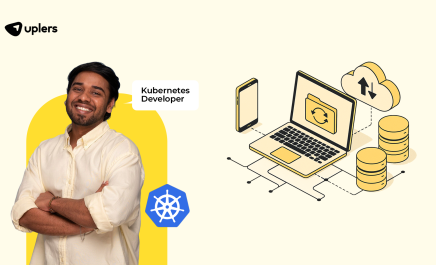How to Hire Remote Developers from Different Countries: A Legal and Practical Guide
- Prachi Shah
- October 9, 2024
- 7 Minute Read

The demand for skilled workers is at an all time high in the competitiveness of the marketplace. Talent supply is sparse to meet the rising hiring demand globally, resulting in the widening skills gap. As a result, to go beyond local borders has become the new preferred option for companies worldwide.
According to the New World of Work Report 2020, 63% of companies went fully remote by the time of the COVID-19 hit, and 82% claim this trend to continue being important for candidates going forward.
While companies are turning to the global talent pool, the process of hiring remote developers from distinct countries has its own set of challenges and legal considerations. This is where blogs like this can supplement as a comprehensive guide on how to hire remote offshore developers, offering legal and practical tips for a smooth hiring process.
So let’s get to the specifics!
Benefits of Hiring Remote Developers from Different Countries
As companies increasingly embrace remote work and the trend shows no signs of slowing down, understanding the nuances of hiring international talent becomes more crucial. For businesses be it startups, or large enterprises, the benefits of choosing to hire remotely are as under:
Access to a global talent poolWhen you expand your search beyond local markets, you can find highly skilled developers with specific expertise that might not be available locally. |
Cost-efficiencyHiring from different countries gives you the opportunity to hire from regions with low living costs. As a result, you can significantly save on salaries and benefits. |
Time zone advantageWorking with developers in different time zones can offer round-the-clock productivity with continuous business operations. This results in an agile time-to-market steering a competitive edge. |
Common Challenges in Hiring Remote Talent
If we see the flipside which too is an essential component of the remote developer hiring guide, the top challenges of remote hiring are as follows:
Cultural and language barriersDifferences in language and culture can result in miscommunication and misunderstandings, delaying the project timeline and outcomes. |
Time zone differencesWhile time zone disparity serves as a benefit, it also can be a downfall. You might face challenges in scheduling meetings and ensuring real-time collaboration for the entire team to be on one page. |
Legal and compliance issuesNavigating the legal landscape of different countries in terms of taxes, employment laws, and contracts can further add to the complexity, requiring careful attention. |
Key Considerations Before Hiring International Remote Developers
Before hopping on the remote hiring journey you must be thorough with the key considerations to keep in check. When considering how to hire remote offshore developers, the following aspects must be considered:
Identifying business needs
Your end goal is the focal point of every hiring effort. You must know what you expect the developer to achieve in terms of your project needs. There must be no confusion with regards to the expectations, responsibilities, and contribution of the developer in your project.
Determining the right skills and expertise
You must have clarity on what are the specific skills and expertise you need in the developer. This includes technical proficiency, soft skills, cultural compatibility, qualifications, and experience.
Establishing clear job descriptions
Job descriptions should never be underrated in the hiring process. They add immense value by clarifying the specifics of the job role to the job seekers and helping hiring managers attract qualified applicants. Vague job descriptions increase the likelihood of flooding your inbox or work desk with several irrelevant applicant profiles.
Legal Aspects of Hiring Remote Developers Internationally

Yes, this is a major concern for the majority of the hiring managers when choosing to hire offshore talent from different countries. When engaging with international talent you must be well–versed in the legal frameworks that govern employment in different countries.
Failure to comply with the legal regulations in terms of local labor laws, tax obligations, and contractual agreements can result in legal disputes, financial penalties, and reputational damage. Let’s explore the key legal aspects that you must consider when hiring remote developers internationally:
Employment laws and regulations
You must be thorough with the employment laws of the country where your remote developer is based. Different countries have different regulations regarding employee rights, benefits, and working conditions.
Complying with local labor laws to avoid legal issues is mandatory. For instance, in some countries providing employees with health insurance, paid leave, and such benefits is a mandatory inclusion in the employment agreements.
Contractual agreements
Another best practice for hiring remote developers internationally is drafting a comprehensive employment contract. The contract must outline the terms of employment, including compensation, confidentiality agreements, work hours, and intellectual property rights.
Also including clear information related to the termination conditions, dispute resolution, and confidentiality are essential to protect both the parties.
Tax implications
There are tax responsibilities that are levied on both the employer and the employee. Employer’s need to be sensitive and aligned with the tax obligations in the developer’s home country. They should know whether they need to withhold taxes or make contributions to social security systems. Also, developers may have to file taxes in their home country and double taxation agreement might have to be considered.
Practical Steps for Hiring Remote Developers from Different Countries
A strategic hiring approach serves as the foundation for finding and hiring the right remote talent from different countries. The vital steps without which your hiring can’t see the light at the end of the tunnel include:
Finding the right talent
To find the best talent you need to source candidates from appropriate online job boards, freelance platforms, and professional networks. Platforms like LinkedIn, Upwork, and Toptal can connect you with a wide range of developers. Additionally, networking and referrals can also work wonders as they connect you with potential candidates with a proven track record.
Conducting effective interviews
When you interview candidates across distinct time zones it’s essential to be flexible with the schedule. Use video conferencing tools like Zoom and Skype to conduct interviews. When you interview the developers your questions should be focused around assessing technical skills and soft skills of the developer such as problem-solving approach, cultural fitness, innovativeness, and so on.
Technical assessments
To test the skills of the developer listed on the resume in real-time, assign them practical coding tests, project-based assignments, and technical assessments. This will give you a clear understanding of their technical competence to avoid hiring mistakes and ensure timely project delivery.
Onboarding Remote Developers from Different Countries
You must have a well-structured onboarding plan in place to seamlessly integrate remote developers into your team. As a part of the hiring checklist, we have discussed the challenges, benefits, key considerations, legalities, and hiring process. It’s now time to discuss what the onboarding process should look like in your question of how to hire remote offshore developers.
Create a structured onboarding plan
A structured onboarding plan is one that covers all aspects of integrating the remote developer into your team. This includes providing an overview of the company’s mission, values, and goals, and a detailed introduction to the team members and the project they will be working on.
To streamline this onboarding process for you, there are several hiring platforms that can help. Uplers is one such platform that can simplify the process by handling everything from talent sourcing to onboarding. At Uplers, we aim to serve as your end-to-end hiring partner to ensure a smooth transition of remote developers in your team.
Our 4-step vetting process makes it very straightforward and effortless as under:
- Provide us a detailed job description.
- We will matchmake the top 3.5% of Indian remote talent from our 1M+ talent network. This is done via aptitude evaluation, technical assessment, skills evaluation, and language proficiency test. Additionally, we use an AI matchmaking algorithm to offer you more precise candidate profiles.
- Once this is done we arrange a virtual interview slot for you with the applicants you have shortlisted.
- We take care of all the onboarding and documentation formalities at a transparent pricing.
Set up communication and collaboration tools
Effective communication is the key to successful remote work. Set up communication and collaboration tools such as Trello, Slack, Asana, Jira, etc. to ensure seamless interaction between team members. Have guidelines for regular check-ins, follow-ups, and feedback sessions to keep everyone aligned and engaged.
Provide necessary resources and access
You must ensure that the remote developers have access to all necessary resources and tools repository needed to perform their job. This includes account setting, granting access to code repositories, and providing any specialized software or hardware needed for the role.
Managing and Integrating International Remote Developers
To effortlessly manage and smoothly integrate remote developers into your team you must abide by certain hygiene checks. For a lot of the hiring managers struggling with how to hire offshore remote developers, management and integration is a concern.
Pay attention to the following:
Establishing clear communication channels
Clear and consistent communication is always the key for the successful functioning of remote teams. You must establish regular meetings such as daily stand-ups or weekly check-ins to keep everyone aligned. Use appropriate project management tools to track progress and ensure timely completion of tasks.
Performance management and feedback
Regular performance reviews and feedback sessions serve as the foundation for maintaining productivity and ensuring that remote developers meet your expectations. Utilize appropriate performance management tools for goal setting, tracking progress, and offering constructive feedback for growth and improvement.
Building a cohesive team culture
To build a strong team culture is also vital for remote team setting. Encourage team bonding via virtual events, regular team calls, and open communication. When there is a sense of belongingness and collaboration remote developers feel more connected and motivated.
How Uplers is Here to Help

At Uplers, our aim is to bridge the gap between qualified and skilled Indian talent and global hiring managers. We make remote hiring from India effortless offering a streamlined and efficient hiring solution. Our 4-step vetting process discussed in the above section gives you access to top-tier Indian talent by tailoring the process to your specific needs.
Uplers takes complete ownership from talent sourcing, rigorous screening, to custom matchmaking, and seamless onboarding. With Uplers you can avail the following advantages:
- Access to a 1M+ talent network across 5+ time zones.
- Top 3.5% of AI-vetted Indian talent profiles in your inbox within 48-72 hours.
- Up to 40% cost-savings.
- A transparent pricing model.
- 2 weeks risk-free trial period.
- 30-days talent cancellation policy.
- Lifetime free talent replacement policy.
Navigating the Complexities of International Remote Hiring
There are a wealth of opportunities that you can unlock once you have clarity on how to hire offshore remote developers. Remote work is redefining the future of work allowing businesses to build a successful team that can drive your business forward. Whether you are handling the hiring process internally or partnering with platforms like Uplers, you must prioritize a smooth and effective hiring process to reap substantial benefits of international remote hiring.

Thank you for submitting the details!
We will keep your information safe. Feel free to contact us with any questions at hello@uplers.com
Please check your email for next steps shared by Robert.

















